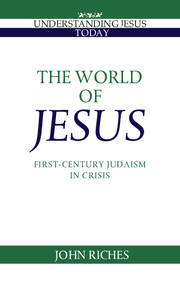Book contents
- Frontmatter
- Contents
- Introduction
- 1 The Political, Economic, Social, and Cultural Context of First-Century Palestinian Judaism
- 2 Unity and Diversity in Judaism from the Third Century B.C.
- 3 Membership of the People of God
- 4 Setting Priorities and Maintaining Group Standards
- 5 Hopes for the Future
- 6 Jesus and His Kingdom
- Conclusion
- Suggested Reading and Questions for Discussion
- Significant Dates, Events, and Writings
- Deuterocanonical and Nonbiblical Works Cited
- Index
3 - Membership of the People of God
Published online by Cambridge University Press: 05 June 2012
- Frontmatter
- Contents
- Introduction
- 1 The Political, Economic, Social, and Cultural Context of First-Century Palestinian Judaism
- 2 Unity and Diversity in Judaism from the Third Century B.C.
- 3 Membership of the People of God
- 4 Setting Priorities and Maintaining Group Standards
- 5 Hopes for the Future
- 6 Jesus and His Kingdom
- Conclusion
- Suggested Reading and Questions for Discussion
- Significant Dates, Events, and Writings
- Deuterocanonical and Nonbiblical Works Cited
- Index
Summary
We have been considering the ways in which prolonged exposure to foreign rule and influence made it difficult for Jews to maintain their traditional way of life, undermined their sovereignty and national identity, made them long for some resolution to their problems, and on occasion brought them into direct and costly conflict with their foreign overlords.
When groups are under threat from alien forces as were the Jews it is natural for them to begin to ask questions about their own identity, about what it is to be a Jew, what it is to be a member of the group. In the first place there is an obvious sense in which people in situations of crisis and conflict want to know not merely who belongs to their group but whose loyalty can be counted on in the struggle against the foe. In France during World War Two it would not have been enough to know that someone was French. One would have had to ask was she a true Frenchwoman? The answers to such a question would have varied, moreover, in accordance with the views that were taken of where the national interest lay. That is to say, under such circumstances, it would not have been enough to appeal to standard definitions of group membership: birth, nationality, education, language. Further marks of membership would be required, for example, membership of or support for certain subgroups, such as the Resistance, and the espousal of certain policies.
- Type
- Chapter
- Information
- The World of JesusFirst-Century Judaism in Crisis, pp. 49 - 67Publisher: Cambridge University PressPrint publication year: 1990



